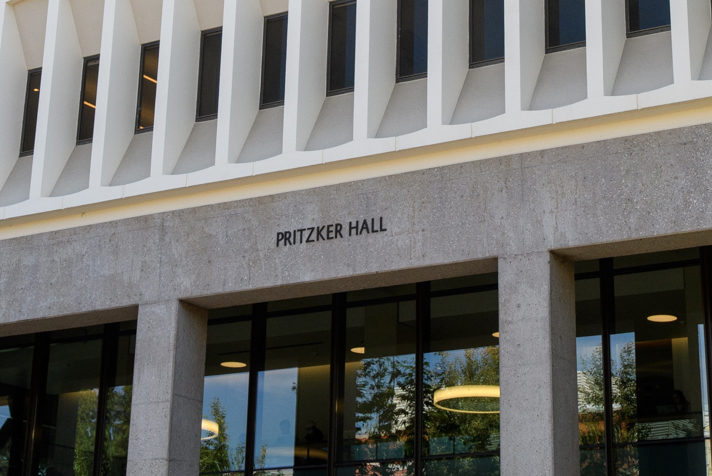Study finds Korean immigrant mothers struggle to find care for kids with autism Pritzker Hall, which houses some psychology labs at UCLA, is pictured. Researchers from UCLA and California State University, Los Angeles found that Korean American immigrant mothers face certain barriers – including linguistic and cultural barriers – when seeking care for their children who have autism. (Kyle Kotancheck/Daily Bruin senior staff) By Caroline Sha Nov. 20, 2023 9:11 p.m. Researchers at UCLA and other Los Angeles institutions found that immigrant mothers of Korean American children with autism face unique difficulties when seeking diagnosis and support services for their kids. In the study, which was published in October, the researchers analyzed previously conducted interviews with these mothers, said HyeYoung Kim, the study’s first author. Kim, who is a doctoral candidate in human development and psychology through a joint program between UCLA and California State University, LA, said they found that these difficulties can significantly delay parents’ access to resources for their child. Kim said she was inspired to conduct the study by her own experience as a Korean immigrant mother of a child with autism. The study identified five major themes surrounding Korean immigrant mothers’ journeys in navigating the diagnosis and support systems, including cultural beliefs and values, language barriers, complex emotions, immigration and navigating systems, and facilitators. Kim said many mothers had not even considered that their children could have autism because of a lack of awareness surrounding autism in their home countries. “Many mothers told me that because they didn’t really have many opportunities to contact or interact with people with disabilities when they were in school, … they didn’t really recognize what (the) autism spectrum looks like,” Kim said. These mothers also experienced difficulties in getting their children diagnosed because it was difficult to determine if their children’s language delays were a result of bilingualism or autism, said Sohyun Kim, a postdoctoral scholar in education and a co-author of the study. In addition, HyeYoung Kim said parents often received inconsistent information from health care professionals about whether to speak both Korean and English at home, even though previous studies have shown that bilingualism does not hinder language development. The authors also found that there were often discrepancies between systems of diagnosis in South Korea and the United States. For example, Han Lee, a co-author of the study, said there is a lack of accurate translations for diagnostic protocols between English and Korean. Additionally, one parent reported that in South Korea, she was told that their child could not be officially diagnosed with autism until the age of three – even though she was already noticing signs of the condition before then, according to the study. “My son, he goes to community college – you wouldn’t know he was autistic if you didn’t spend multiple hours with him,” said Robin Dodds, an associate professor of special education at CSULA and co-author of the study. “He wouldn’t be recognized as autistic in Korea, but here most definitely he has an autism eligibility.” But despite stricter diagnostic criteria in South Korea, many of the parents who have already received a diagnosis for their children there had to wait again to receive an American diagnosis, HyeYoung Kim said, adding that without an American diagnosis, they could not access services in the United States. As a result of these different perceptions of disability, diagnostic tools are not as consistent across nations as some professionals would like them to be, Lee said. “It’s very troubling to me as a special education teacher myself because there should be multiple ways to look at disability, but it shouldn’t vary from country to country or government to government,” she said. The authors also found that the mothers experienced negative emotions, such as when hearing insensitive comments about autism from those around them, Sohyun Kim said. However, these feelings were also powerful motivators that inspired them to better understand their children’s diagnoses, she added. It was also easier for the child to be accepted by their whole family once their fathers had accepted the diagnosis because of family dynamics in Asian culture, HyeYoung Kim added. Research like this may help different institutions increase the accessibility of autism support and diagnosis services, said Lee, who is also a joint doctoral student in human development and psychology. She added that while the percentage of people with autism who are also Korean American is growing, factors such as immigration status can also make it much harder for them to access the resources they need. Future studies that expand on this paper could include examining the experiences of other family members, such as the fathers of children with autism, Dodds said. She added that it might be useful to see how parental perceptions of disability influence a child’s perception of themselves. Sohyun Kim added that studies could also be done to explore how specific subgroups of Korean immigrant families – such as families that are spread across different countries or families where only one parent is a first-generation immigrant – experience having a child with autism. She also said similar studies that give voice to the communities are needed to capture the diverse perspectives and histories of this community. While it is important to do research on groups underrepresented in research, it is also critical that these groups are given the opportunity to represent themselves in these studies, Lee said. “Family participation in research is really important,” she said. “Focus groups, interviews – they highlight so much of the experience, and the numbers only tell us so much.”
This content was originally published here.
